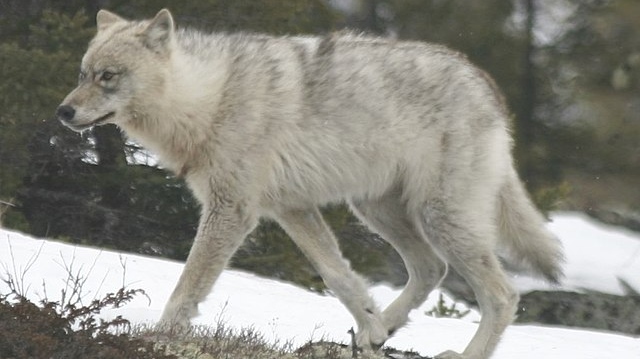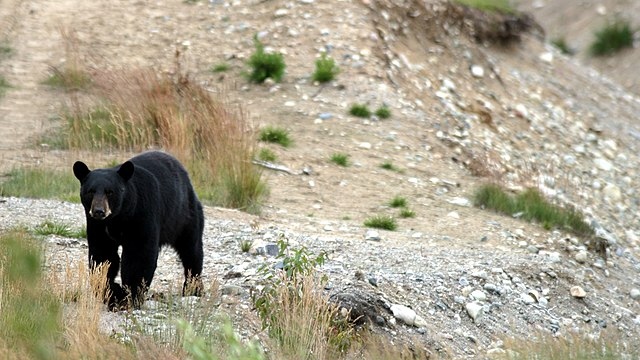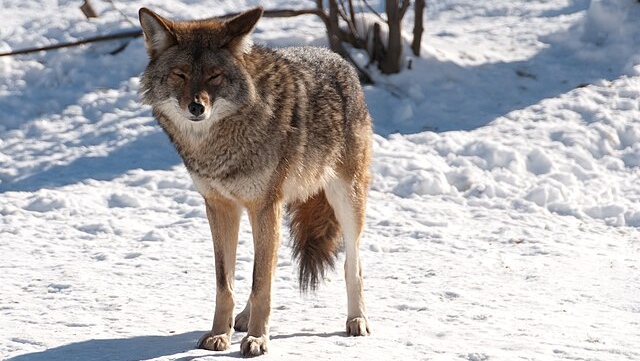Hundreds of wolves, bears and coyotes killed in attempt to help Quebec caribou
 A caribou is photographed in 2017 in the Parc National des Grands Jardins in Quebec. (Wiki commons)
A caribou is photographed in 2017 in the Parc National des Grands Jardins in Quebec. (Wiki commons)
In recent years, hundreds of wolves, bears, coyotes and other animals have been killed under Quebec government programs to help the caribou survive.
However, the Environment Ministry does not know whether these controversial measures aimed at controlling cervid predation are effective.
In Gaspésie, "168 coyotes were trapped as part of winter trapping in 2023"' and between "38 and 144 coyotes" are trapped each summer to protect caribou, according to data from the ministry.
Black bears, between "23 and 110" a year "as part of summer trapping," are also killed to protect the mountain caribou in this region.
Wolves are also culled to help caribou populations.
For example, since 2020, "85 wolves have been harvested by trappers in the Charlevoix region," and between 2011 and 2019, 44 wolves were shot in Abitibi-Témiscamingue.
 A wolf is photographed in the wild in Quebec. (Wiki commons)
A wolf is photographed in the wild in Quebec. (Wiki commons)
But these predation control programs, which have been in place for several years - even decades in the case of the Gaspé Peninsula - have failed to limit the decline in caribou numbers.
Worse still, in the case of the Gaspé Peninsula, "today, predators are not only more abundant, they are also more effective," according to professor Martin-Hugues St-Laurent, whose work focuses on the impact of habitat alteration on the ecology of large mammals such as caribou.
St-Laurent, who heads the animal ecology research program at the Université du Québec à Rimouski (UQAR), pointed out that eliminating predators can hardly be effective if the caribou's habitat continues to be altered.
"From 1990 to today, we've harvested around 50 to 60 per cent of the old-growth forests around the Gaspé Park, so it's clear that while we're removing predators, if we harvest half the forest, we're counteracting the positive effect of predator control, so we've worked a little bit backwards," explained St-Laurent.
Is it effective?
The Canadian Press asked the Ministry of the Environment about the effectiveness of its caribou predation control measures.
In an e-mail exchange, the ministry's communications director, Ève Morin Desrosiers, replied that "the effects of actions targeting caribou predators are only perceptible after several years of intensive and sustained control, which is not currently the case."
 A young black bear is photographed in northern Quebec. (Wiki Commons)
A young black bear is photographed in northern Quebec. (Wiki Commons)
For the Ministry, "intensive control" means that the program "targets a considerable reduction in predator density and covers large areas."
The ministry's spokesperson also clarified: "Considering that the ministry and its partners are not currently deploying such intensive programs (...), it is not possible to assess the effect of this measure in Quebec on adult caribou survival rates or on recruitment rates."
Programs that work if you kill a lot of predators
St-Laurent explained that there is "a link between the removal of individuals, coyotes, bears or wolves and an increase in the quality of the caribou herd, but for it to really work, you have to push the machine really hard. It takes a very, very, very imposing predator harvest."
Elsewhere in the country, controlling caribou predators has sometimes led to healthier herds.
For example, in the early 1980s in the Yukon, the government implemented a culling program that reduced the wolf population "by 83 to 86 per cent," allowing the Finlayson caribou population, which was estimated at around 2,000, to almost double and halt its decline.
This is according to an article published in the journal Conservation Science and Practice in 2022, entitled "Efficacy and ethics of intensive predator management to save endangered caribou," in which Saint-Laurent participated.
The article also reports "that a review of wolf management programs in western North America concluded that wolf removal would only be effective if 65-80 per cent of wolves were removed over a sufficient area and duration, typically four years."
The study also states that to enable a caribou population to grow after the majority of predators have been eliminated from its territory, "the underlying mechanism of excessive predation must be addressed" and "for many caribou populations, this will require habitat restoration or re-establishment" to reduce "the predator's hunting efficiency."
In other words, for predator control programs to work, the caribou's habitat must be restored, rather than continuing to disturb the animal by cutting down trees in its habitat.
Counter-productive measures?
Biologist and wildlife photographer Hugues Deglaire is among those who question the relevance of eliminating animals in an attempt to save others.
He worked as a naturalist for five years in the caribou habitat of Gaspésie National Park, where predator control programs are in place.
"I had to ask myself questions on a daily basis. I climbed mountains practically every day, and it tortured me because I said to myself: 'but we're probably doing anything wrong,'" he said.
By eliminating large predators, we run the risk of causing "unpredictable impacts on other elements of the ecosystem," said Deglaire, one of the co-founders of the Association québécoise pour la protection et l'observation de la faune (AQPOF).
According to this organization, predator control programs can sometimes produce the opposite of the desired effect.
"Coyotes tend to live in families and even packs," and "when they feel persecuted, they'll split up, and often in pairs, so instead of having one family with one breeding pair, you'll have three families, with three breeding pairs," so after a few years, there will be more predators, Deglaire explained.
 Coyotes are one of the caribou predators that are routinely targetted in cull programs. (Wiki Commons)
Coyotes are one of the caribou predators that are routinely targetted in cull programs. (Wiki Commons)
This assumption is widespread among animal protection groups opposed to canid trapping.
"It's known that reproduction will be stimulated, as each remaining individual has access to more resources," which therefore induces "a better physical condition and a better investment in survival and reproduction," said St-Laurent.
However, the professor of animal ecology added this nuance: "It is extremely rare for abundance to exceed the numbers seen prior to the control program. This is a complex issue, often poorly documented or misrepresented by animal rights and ethical organizations."
Martens, foxes and lynxes trapped
Deglaire explained that he has occasionally seen animals that are not caribou predators accidentally snared.
"Snare traps are not selective" because "a snare for wolf or coyote can also take marten, fox or lynx," explained the biologist and wildlife photographer, who has also often observed animals suffering as a result of predator traps.
Questioned on the subject, a ministry spokesperson indicated that "it does indeed happen that non-targeted species are captured," but that "the trapping methods employed are designed to minimize these accidental captures, for example by selecting particular trapping gear or by including systems allowing release."
The Canadian Press asked Environment Minister Benoit Charette's office if he had any information to show that caribou predator control is working.
The office simply replied that "population management measures such as predator control are part of the ministry's recommendations for the protection of caribou," and that "this type of intervention is also recommended elsewhere in Canada."
This report by The Canadian Press was first published in French on Sept. 15, 2024.
CTVNews.ca Top Stories

Upcoming GST relief causes confusion for some small Canadian businesses
A tax break for the holiday season will start this week, giving some Canadians relief on year-end shopping. But for small businesses, confusion around what applies for the GST relief has emerged.
Public support key but harder to keep as Canada Post strike drags on, experts say
Public support is key to the success of a strike, experts say, but as the Canada Post strike drags on, that support is likely getting harder to maintain.
Ontario mulls U.S. booze ban as Trump brushes off Ford's threat to cut electricity
Incoming U.S. president Donald Trump is brushing off Ontario's threat to restrict electricity exports in retaliation for sweeping tariffs on Canadian goods, as the province floats the idea of effectively barring sales of American alcohol.
Canadian officials eyed 'new opportunities' no matter who won U.S. election: memos
As the U.S. presidential election loomed, Canadian officials envisioned new opportunities for co-operation with their southern neighbour on nuclear energy, supply chain security and carbon capture technologies — no matter who won the contest, newly released government memos show.
Man who set fires inside Calgary's municipal building lost testicle during arrest: ASIRT
Two Calgary police officers have been cleared of any wrongdoing in an incident that saw a suspect lose a testicle after being shot with an anti-riot weapon.
She took a DNA test for fun. Police used it to charge her grandmother with murder in a cold case
According to court documents, detectives reopened the cold case in 2017 and then worked with a forensics company to extract DNA from Baby Garnet's partial femur, before sending the results to Identifinders International.
Suspected Chinese spy with business ties to Prince Andrew barred from U.K.
A suspected Chinese spy with business ties to Prince Andrew has been barred from the U.K. because of concerns he poses a threat to national security.
President Macron names centrist ally Bayrou as France's next prime minister
French President Emmanuel Macron on Friday named centrist ally Francois Bayrou as prime minister, after a historic parliamentary vote ousted the previous government last week.
Climate groups tried to spur action with a Taylor Swift ticket giveaway. Can it work?
Taylor Swift commands a legion of devotees, but among the thousands decked out in cowboy boots, friendship bracelets and glitter at her Canadian performances, one was not like the others.

































